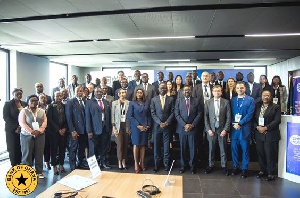Business News of Thursday, 15 May 2025
Source: www.ghanawebbers.com
SSA central banks target lower remittance costs
A seminar in Accra was hosted by the Bank of Ghana (BoG) and the IMF’s African Department. BoG Governor Dr. Johnson Asiama highlighted concerns about remittance costs. He stated that these transfers are vital for many households in Africa.
“Cross-border payments remain slow, costly, and opaque,” he said. He called for coordinated action to improve payment systems.
Remittances contribute significantly to GDP in many African countries. However, average transaction costs exceed global targets due to outdated systems and fragmented regulations.
To tackle this issue, Ghana is enhancing its role in regional digital finance initiatives. The country participates in the Pan-African Payment and Settlement System (PAPSS). This system connects 15 central banks, 12 payment switches, and over 50 commercial banks.
Dr. Asiama emphasized that PAPSS enhances financial sovereignty. It can support small businesses and reduce settlement times for cross-border trade.
The two-day seminar focused on “Remittances, Compliance, and Interoperability.” It gathered central bank governors, senior IMF officials, and World Bank representatives. They discussed challenges in developing central bank digital currencies (CBDCs) and digital payment infrastructure.
Ghana is co-leading two major initiatives with the National Bank of Rwanda. One initiative is the FinTech Licence Passporting Framework. This framework aims to harmonize regulatory processes across multiple markets.
The second initiative is the Africa NextGen Digital Payment Infrastructure project. This project focuses on creating secure payment systems tailored for Africa's needs.
While infrastructure is important, policymakers stressed regulatory agility as essential too. Multi-regulator sandboxes allow testing of new technologies while ensuring oversight.
Dr. Asiama highlighted supervisory technologies (SupTech) for real-time compliance and data sharing. He argued that Africa must shape global standards on digital identity and data privacy.
“Africa must be at the table when global standards are set,” he stated. Participants noted that digital trade agreements could enhance interoperability across the continent.
However, they emphasized that reforms should improve lives directly. “We’re working for single mothers keeping their children in school,” said Dr. Asiama.
The seminar outcomes will guide future strategies for low-cost payment systems across sub-Saharan Africa.











